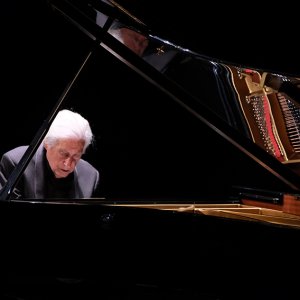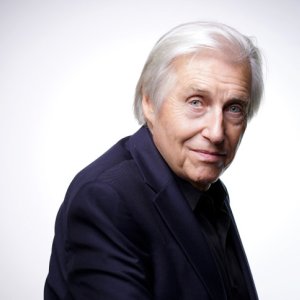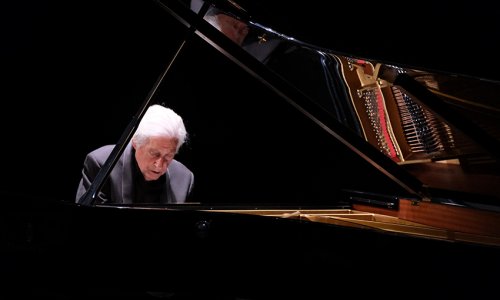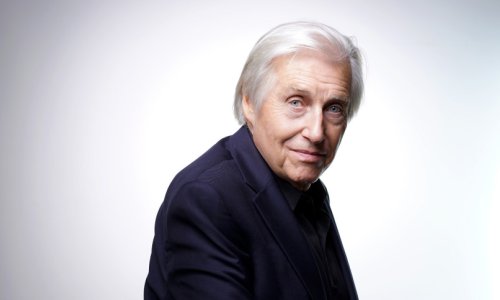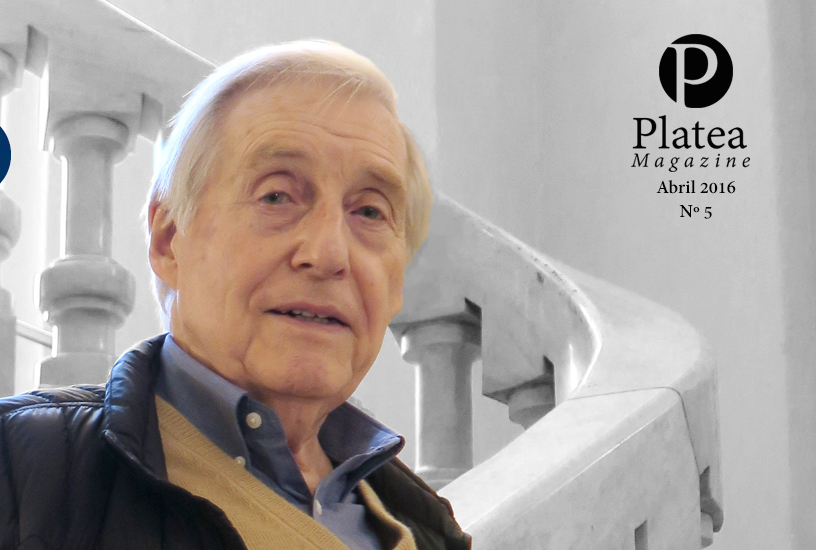
Joaquín Achúcarro: "Each and every note I have played has been a step on the path of my life"
Maestro Joaquín Achúcarro needs no introduction. With a career in the forefront of the worldwide piano for over 65 years and after 25 teaching in The United States, the Bilbao pianist treasures art and reflection on each of his fingers and words. Generous with Platea Magazine, last February made a stop along the way in one of his many trips between America and Europe to meet us at the Circulo de Bellas Artes in Madrid, a few days of receiving a tribute in the Southern Methodist University in Dallas, where he leads a quarter century teaching classes. Talk with Joaquín Achúcarro is converse with the piano, with music, art and life. He is undoubtedly the pianist of the reflection through the senses.
25 years working as a professor in Dallas and you’ve been loved and respected for such a long time... What’s your particular methodology?
Whoops! I can’t even explain why... I guess I’ve been doing well all these years! I have developed my own methodology along my piano career. I’m lucky enough to work at Dallas University, a place where I have enough time to study pupils’ development and that is in fact the precise opposite of what a Master Class means, a couple of minutes to understand what you’re facing, a couple of minutes to diagnose in order to prescribe an effective treatment in the time remaining. I made a terrible mistake at the time I began my career as a professor: I tried to convince pupils and newcomers are somehow sceptical. It’s a long road where students unveil the unknown as well as they find out some more from me, and it takes a long time indeed. In recent times, very very lately, I may say I got ‘cocky’ (laughs).
A worldwide recognized pianist getting ‘cocky’?
I usually have no more than two years to work with them, have a very high level and often my work may lie in two aspects: take excellences and try to correct deficiencies. Some has been playing Liszt, Prokofiev, Rachamninoff, etc. and not know what to do before a Brahms intermezzo, an adagio of Mozart or Chopin nocturne. And, conversely, some people need to develop their strength, digital speed, octaves, etc. Re-create or improve a muscle it is very important. It's a little paradox of getting fingers like a sledgehammer you can, gently, husking a hazelnut to "translate" the text written by a genius seeing the best we can through our personality.
What are the most common mistakes first time students make?
Every hand is a unique world unto itself. And I’m talking about just one hand and not a pair of hands. Common piano-playing mistakes include pedaling errors, an untimely troppo forte chord… The ultimate outcome should be ‘cantabile’ played, a powerful and beautiful sound avoiding shrillness and piano-pounding. A chord over each degree of the cromatic scale, and even an extreme dynamic, even the louder fortissimi must be paired with a softly played piano dynamic. And at the end of life what really matters is sensitivity.
You talked about convincing pupils... and you once told me the audience must be convinced by persuading yourself first... but how to achieve it?
How hard it is to achieve! How hard it is to persuade yourself! Rainer Maria Rilke wrote a letter entitled Letter to a Young Poet, in which you may find the following paragraph: “And if out of this turning inward, out of this absorption into your own world, verses come, then it will not occur to you to ask anyone whether they are good verses.” And I believe that’s the way it should be. I’m always asking myself whether every little thing I do is right or wrong. There may be some things well done throughout my professional career.
As a newcomer to piano studies, what question should I ask myself?
You should ask yourself everything! How do you intend to get the message out there to your audience? What do you see on the score and what do you think about the composer’s intention? Are you able to get the message out by playing the piano, too rich in nuances and endless sounds? The sounds you may discern may be quite an exciting experience and may be also an extremely scary experience.
As an interpreter of piano compositions, is your approach a “conservative” one or a “groundbreaking” one?
I don’t really know what I am. I’m just following my own path guided by my musical ear and knowledge. We all, as piano players, may sound quite different and we don’t have to like or enjoy another pianist way of playing. We all have got our own and unique sound: Rubinstein, Horowitz, Michelangeli, Schnabel, Gieseking... just to mention a few of them. I’m referring in particular to deceased individuals as I don’t know whether some day a unique sound will be set on Zimmermann, Achúcarro or Pogorelich. The quest for my own and unique sound is somehow relevant to understand my professional career, at least that’s what people say...
Let’s talk about Achúcarro sound. What’s the difference between your own sound and the new generations of piano players, a silence-filling?
What I’m interested in is this issue. The sound consists of the notes making up a musical work, not simply a sequence of musical notes by themselves; a musical note does its work, comes in and out, but in the meanwhile... what happens? I regard musical notes as living entities, and I may use the word ‘Dynamogeny’. I don’t regard musical notes as an individual sequence; by playing a single note a forward projection is born, a “continuum time-sound”, and a lack of continuity is like a punch in the stomach. Each and every note I’ve played through my professional career means a step on my own life’s path. I’m talking on tunes, dinamogeny may get too low by a ritardando or diminuendo and maybe it won’t get high again...
There are a lot of musical performers regarding music as consumer goods. When I listen to you I realize you chose your own way as well as you didn’t care about success.
It isn’t about choosing among options, it’s about being a true artist. I really don’t know how to do it in a different way. Each and every artist, just like each and every human being, is unique in their own way. My masters used to tell me there are four key concepts in music: accelerando, ritardando, crescendo and diminuendo. When you merge them all, you’ve got the music. I’ve worked on all of them on my own way. In Rodrigo’s concerto I gradually increased the tempo, accelerando, at the end of the second and fourth movements, as the four movements ended up ritardando crescendo and I thought the original way was somehow ‘dull’.
‘Nights in the Gardens of Spain’, a premiere that took place a hundred years ago; you can’t say it’s ended up bursting out...
That piece of music means a lot to me... my honeymoon was ruined by ‘Nights...’! My wife spent our honeymoon walking around by her own while I was studying the score. At first I might underestimate ‘Nights...’, but I love them. I just didn’t want the audience to think ‘Nights...’ was my whole musical repertoire.
Would you like to play new repertoire?
I’m resigned to the will of God… and to the will of the one who programs the schedule (laughs). It would have been great to play Strauss’ Burleske. I haven’t been told to do so and I won’t start playing that piece at my age.
At home? For the pleasure of playing...
Some days ago I was playing a bunch of concertos I know by heart... Beethoven, Rachmaninov, Ravel, Grieg...
And what about retirement?
I haven’t thought about it. I’ve got so many things to do untill I drop...
What’s your theory on piano pedalling?
I agree with Chopin: The pedal is the soul of the piano. Pedals offer us an endless range of possibilities. As you play a musical note, you may depress the piano pedal before or after playing the note and even at the same time you play the note; and the sound effect you get by depressing pedals in different ways is completely different... and even sustaining a note, pedalling wins. I’m obsessed with everything related to piano pedalling, vibrating piano strings and harmonic resonances.
At the end, a pianist may be judged regarding his piano pedals abilities...
A hands-feet relationship I’d say. I guess Chopin had a strong aversion toward Beethoven just because acoustic issues. A deaf one and deafness in tuberculosis the other one. Beethoven’s total dissonance was a pressing need and Chopin hated that dissonance. Sound mismatching, ritardando abusing... Mozart composed in the same way but there is no dissonance. Why? I still do not know.
The way we listen to… Has it changed that much?
In the music world, just as it happens in each and every respect, I don’t really think in a sort of ‘Revolt of the Masses’ and all of we should ask ourselves instead: Whom do you think people are following to? And when we are told something is good, Is it all that good we’ve been told? Perhaps we have stopped listening to some performers to listen to other performers… there are different ways of playing and also different ways of listening to, I guess. I remember Alicia de Larrocha taking a bow after a performance in San Francisco as the audience was ecstatic as well as waves of thunderous applause. Every time she left the stage towards the dressing rooms she hit the walls as she thought it was an awful performance. Who was right? Was right Alicia or was right the audience? At last, we the interpreters must feel as the composer felt, we must red the composer’s mind and play that way to the audience.





